
Environmental management
The Energy Community Secretariat is committed to do its utmost to support the Contracting Parties in the transition to sustainable energy, in line with the numerous environmental and climate acts adopted by the Ministerial Council. At the same time, the Secretariat’s supporting role does not come without an adverse environmental impact. For instance, the Secretariat organized 98 official meetings, which were attended by approximately 2.700 participants in 2019. The participation to the Secretariat's events, together with the staff's travelling, amounted to roughly 3.6 million flight kilometers in 2019. These considerations resulted in a decision to engage in introducing the Eco-Management and Audit Scheme (EMAS) at the Secretariat.
The pages below highlight the Secretariat's latest EMAS performance, key principles and deliverables, including milestones of the project. The focus is put on measures particularly relevant to the Secretariat's staff and visitors to its premises.
-
About EMAS
To be in a position to identify and quantify the Secretariat’s environmental footprint, the EMAS project team undertook a systematic review of all its environmental aspects and the corresponding environmental impacts related to its business activities in June 2020. The aspects and impacts are subject to regular reviews. They are also tabled for discussion at the management review meetings. The fundamentals of the 2020 assessment are still fully valid.
Significant impacts and aspects

All aspects with an overall rating of more than 2,5 are considered as significant (out of maximum 4). The Secretariat addresses these aspects and activities particularly when identifying actions for its environmental programme.
Principle of continuous improvement

Committed to continuous improvement, EMAS certified organisations work in cycles. We complete our last actions while we already have started to draft the next programme. Regular review of our rules, registers and records assure checks and balances.
-
Environmental Policy
As one of the first steps in the EMAS process, the Secretariat published its first Environmental Policy in July 2020. This paper underlines the commitment by the Secretariat, and particularly that of its top management, to continuously reduce its adverse environmental impacts.
The Policy objectives form the basis for the Secretariat’s environmental programme. An annual review of the Policy is an integral part of the ECS’s EMS management review.
2022 Environmental Policy
The last policy update took place on 28 November 2022. While the core objectives have remained unchanged, there is greater emphasis on communicating EMAS and influencing, motivating and helping the ECS stakeholders to achieve better environmental performance.
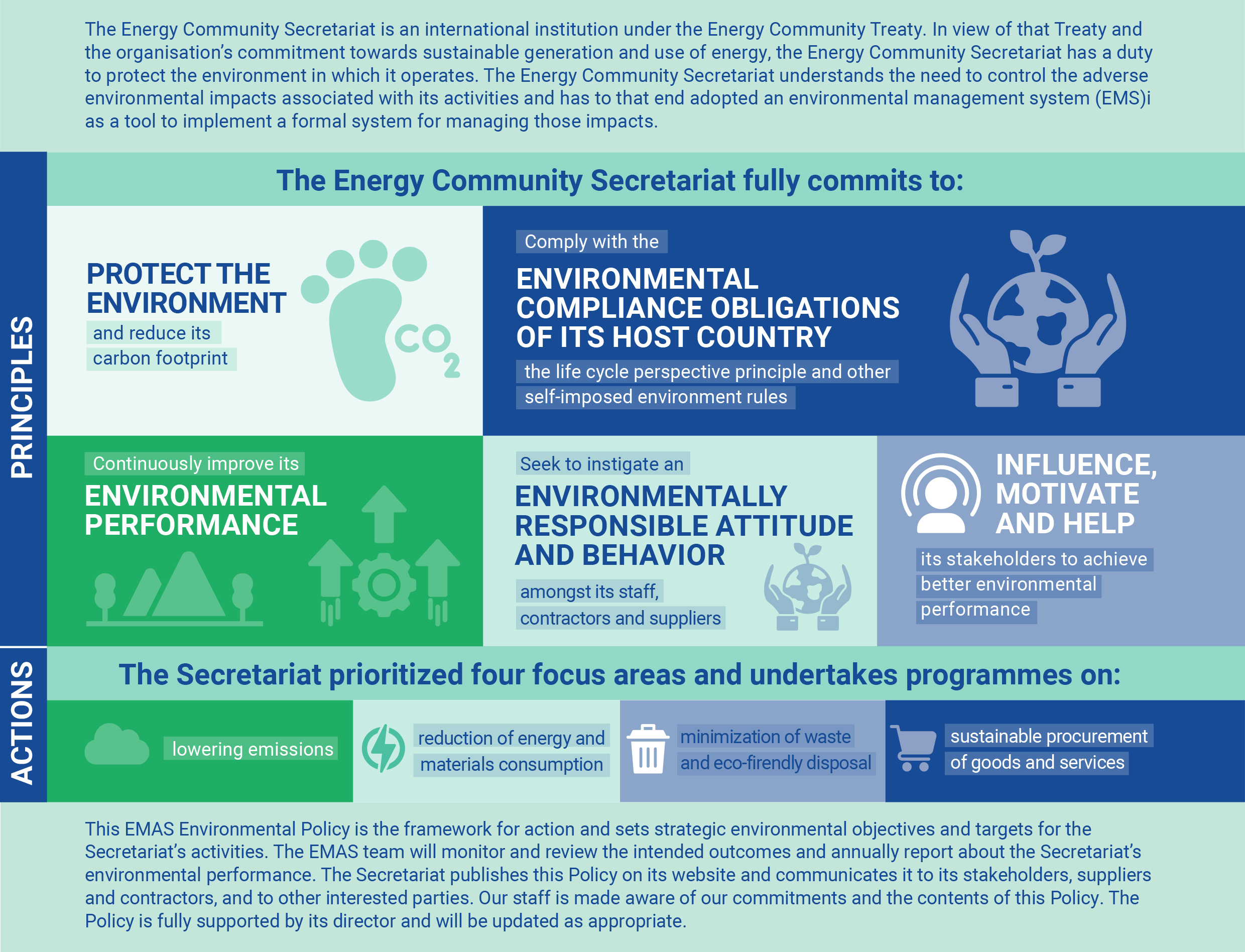
-
Environmental Programme
The objectives stated in the Environmental Policy constituted the starting point for the Environmental Programme. Each objective is supported by one or several targets. For each target, the EMAS team determines actions with clearly defined deliverables, deadlines and person in charge.
The programme is an internal working document, subject to regular review and updates. The Secretariat reports about the conducted actions in its Environmental Statements.
As regards the type of actions, we differentiate between the following:
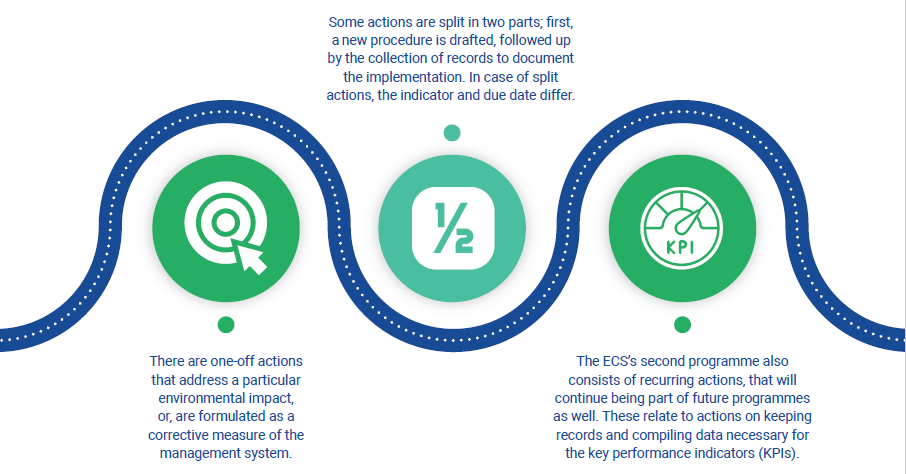
-
Environmental Statement
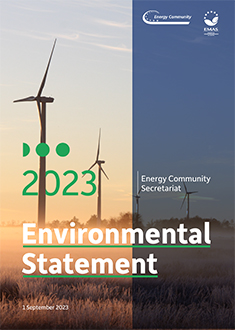
The Policy specifies the focus areas and the organization's objectives in terms of environmental performance. The environmental programme, in return, translates these objectives into an action plan with measurable targets. The targets are implemented by actions with a pre-determined deliverable and due date. The policy, the programme and the key performance indicators form the core elements of the statement.
The first 2021 Environmental Statement outlined the key achievements until end of 2020 with an outlook of the actions to be completed latest by end of 2021. In July 2022, solely the 2021 KPI data table was submitted to the competent Austrian body.
The 2023 the statement was validated by an external auditor in September 2023. -
EMAS Milestones
The EMAS certification requires the setting up of an internal environmental management system (EMS) that addresses the organisation's risks and opportunities related to its environmental aspects, compliance obligations and other issues. After the EMS is set up, the work is done in cycles - the performance reporting runs in parallel with the internal audit, policy review and establishment of the programme for the next period.
Below the Secretariat's EMAS milestones so far:
Dec 2019Stock taking in the form of a 1-day ŐkoBusiness Check consultancy (supported by City of Vienna)
Feb 2020Staff information session to launch the EMAS project, including the introduction of the EMAS team
Jul 2020Environmental review completed, first Environmental Policy published
Read moreMar 2021After first internal audit, signing ceremony of the EMS documentation (EMS Manual, Procedures and Instructions)
May 2021Kanzian Engineering & Consulting conducts the first external audit.
Jul 2021Submission of the validated Environmental Statement, together with certification application, to the Bundesumweltamt (designated competent body in Austria)
Read moreSep 2021Release of the updated Environmental Policy
Read moreDec 2021Second internal audit conducted
Aug 2022Bundesumweltamt grants the Secretariat derogation and re-certification
Nov 2022Release of the updated Environmental Policy
Read moreFeb 2023Third internal audit conducted
Aug 2023Kanzian Engineering & Consulting conducts the second external audit.
Secretariat's green office measures
-
2022 - 2023 highlights
2022 - 2023 achievements highlights
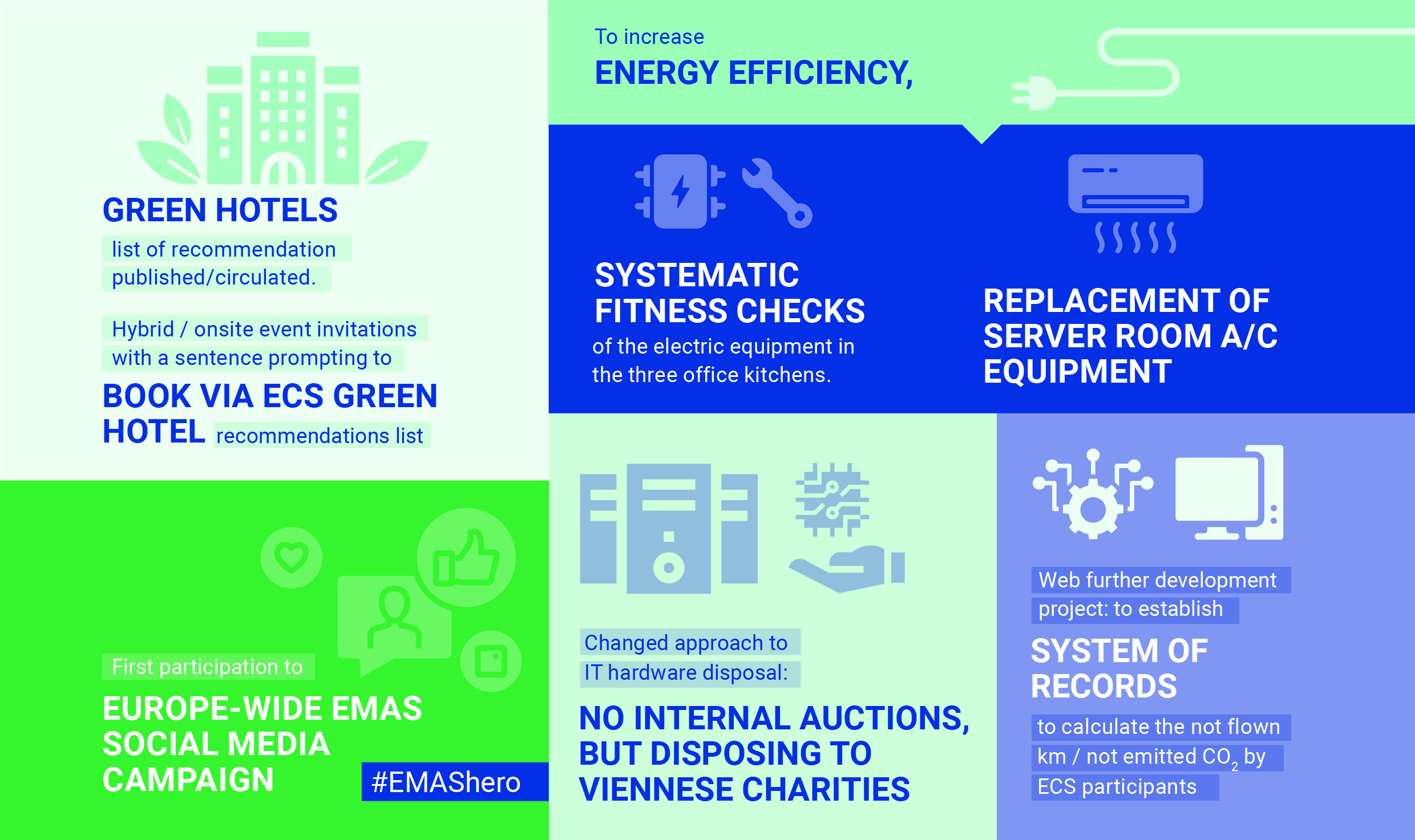
-
Emissions and event management
Emissions and event management
Professional travel, conducted overwhelmingly by airplane, is undoubtedly the most significant adverse environmental aspect related to the Secretariat's activities. Approximately 95% of its emissions relate to the staff's professional travel. At the same time the travel by staff is outweighed by the travelling conducted by its stakeholders.
As part of the drafting of its EMS rules, the Secretariat revised its event management and travel rules to incorporate sustainable principles. The rules now promote video conferencing as an alternative to business travel and prioritize travelling by train whenever possible. Most importantly, the Secretariat's event management builds on hybrid events principle.
To facilitate the hybrid events principle, the Secretariat further developed its online event data collection in first half of 2023. Depending on the user’s participation modus (virtual versus onsite), the content management system automatically calculates travelled versus not travelled kilometres, including an estimate of emitted versus not emitted CO2 emissions. Since July 2023, this data is an integral part of the Secretariat's web and event management reporting.
Q4/2022 - Q1/2024 flown and saved kilometers
status: 29 March 2024
-
Energy Management
Energy management
In order to manage its heat consumption per radiator, the Secretariat labelled all its radiators and thereby created a radiator map for its two floors in 2021. It set rules for optimal heating in the office rooms and secondary office space and replaced old heating thermostats with a new smart heating system. All the thermostats are set on automatic mode, resulting in optimal temperatures during working hours (21C) and lower temperatures during nights and weekends.
It is too early to say whether the assumed three year’s payback period will hold. As the KPI data below shows, there is a clear downward trend in heating consumption (2022 versus 2021; -30%. 2022 versus 2021; -23%), close to the expected energy savings.2019 - 2022 Heating energy consumption
status: 30 June 2023
-
Waste management
Q4/2020-Q2/2023 waste management data
This graphic displays the quarterly amounts of waste produced in the four applicable categories for Q4/2020 – Q2/2023. Paper outweighs the collected glass and plastic. Whilst the share or residual waste varies between 50% to 65%, the Secretariat managed to recycle over 4.300 kg waste since the introduction of waste separation in Q4/2020.
status: June 2023
-
Energy management
Energy management
Identifying potential energy saving measures that it can directly influence, as opposed to those managed at the office building level, was the starting point for the Secretariat's line of action.
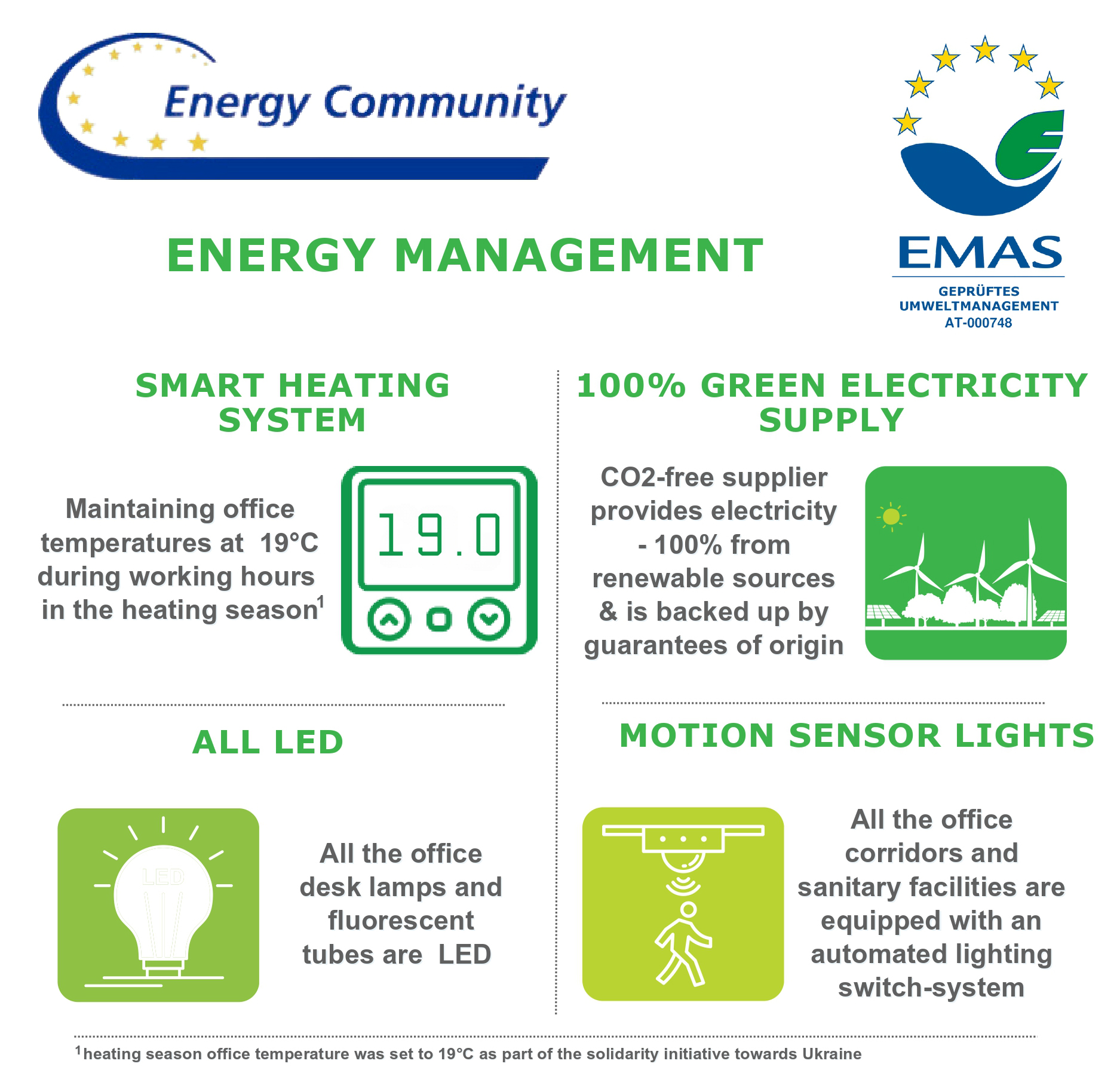
-
Waste management
Waste management
The disposal of waste at the Secretariats premises follows the principles of recycling and safe disposal.
-
Green event measures
Green events management
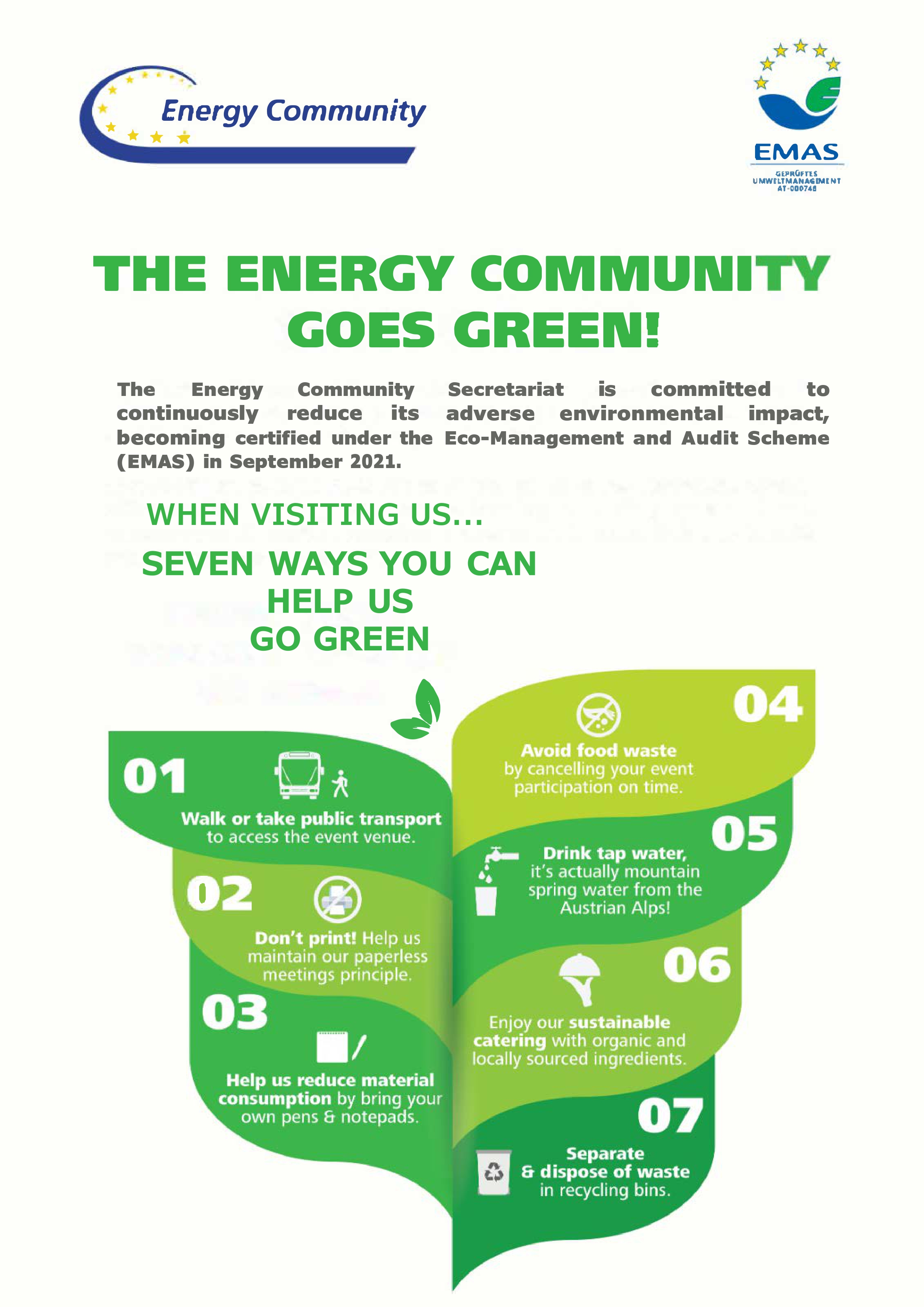
- To be fit for holding hybrid event, the Secretariat upgraded its conference facilities and installed new, supplementary equipment in June 2021. Similarly, event registration features of the website, together with the invitation mass mailing application, underwent a series of changes.
- In line with its new sustainable procurement principles, the Secretariat purchases and prints solely on recycled printing paper. Also, its stationary and other office goods are ordered in accordance to predetermined green purchase criteria.
- The Secretariat successfully completed the tending of its catering services in June 2021. Building on its prior market research, a certified environmental management system and Vienna based operations were included into the procurement criteria. When assessing the offers, the service provider’s waste management concept and use of organic food ingredients were decisive.
- When sending invitations to its Vienna based events, each mailing refers to the Secretariat’s list of recommended hotels. The list gives preference to eco-label hotels, which are located close to its premises or easily reachable by public transportation.
-
Sustainable procurement
Green procurement
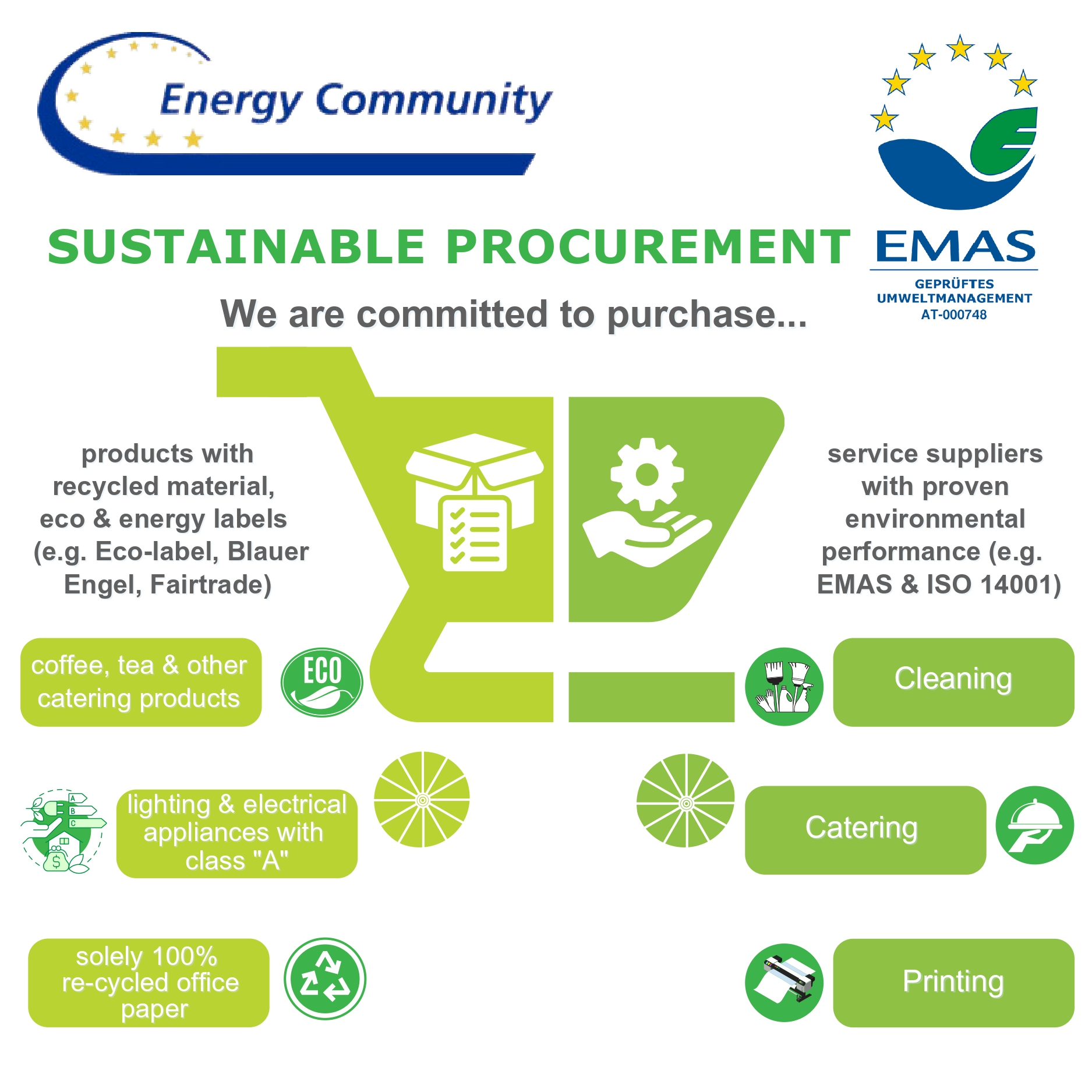
The environmental aspect and impact assessment underlined the significance of procurement in the Secretariat’s operations. This was reflected in the Secretariat's first 2020 - 2021 Environmental Programme with a majority of the actions aiming to incorporate sustainability into its everyday procurement and purchasing activities. To establish a framework, a Sustainable Procurement Procedure was adopted. This procedure is subject to regular revision, whenever a new, sustainable purchase criteria is to be incorporated.- Depending on the contract matter, specific environmental requirements are outlined in the Secretariat's tender documents.
- For small amount purchases, the Secretariat elaborated internal green purchase tips, which are tailored to the categories of products and services concerned. In this way, the Secretariat opts for acquiring works, goods and services that have minimal environmental, social and economic impacts.
-
Sustainable travel
Sustainable travel rules
Baseline
Professional travel, conducted overwhelmingly by airplane, is undoubtedly the most significant direct environmental aspect related to the Secretariat’s activities. Regular travelling by the experts to the Contracting Parties to support the stakeholder’s efforts to implement the Treaty is an integral part of the Secretariat’s business activities. To facilitate information exchange, the Secretariat additionally organizes around 100 events every year, either in Vienna or across the region. This results in further travelling by its staff and by its numerous event participants (in total 3.6 million flight kilometers in 2019).
Revised rules and principles
Whilst setting up its environmental management system, the Secretariat revised its travel and event management rules. In name of sustainable travel principles, the revised travel rules promote video conferencing as an alternative to travelling and prioritize travelling by train whenever possible. Starting 2021, the Secretariat’s event management builds on the principle of hybrid events. Parallel to participation on site, all its events can also be attended virtually. In order to fulfil the criteria of hybrid events, the Secretariat upgraded its conference facilities in June 2021.
Watch a video: How we live EMAS
The Energy Community Secretariat's contribution to EU-wide #EMAShero campaign in June 2023.
